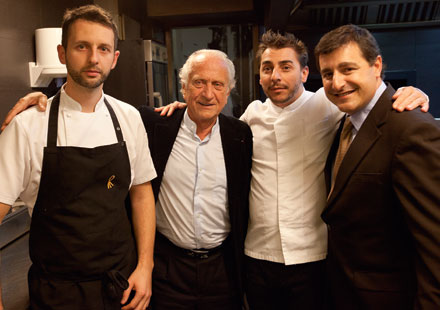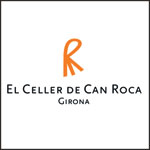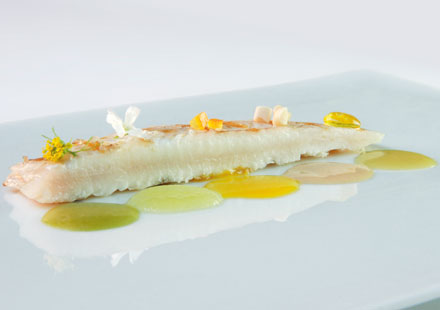Roux Scholar Mark Birchall at El Celler de Can Roca
Mark Birchall, head chef at the Michelin-starred L'Enclume in Cumbria, and this year's Roux Scholar, chose to work at El Celler de Can Roca in Spain as part of his scholarship stage. Kerstin Kühn paid him a visit there, to see how he was getting on and find out what he had learnt
There are few chefs in Britain who will ever get the chance to work in a three-Michelin-starred kitchen, and fewer still who will get their pick of any of these around the world.
So it was no surprise to see Mark Birchall - head chef at the Michelin-starred L'Enclume in Cartmel, Cumbria, and the current Roux Scholar - become the envy of many last July when he announced he was to go and spend three months working in the kitchens of El Celler de Can Roca in Spain.
At the time Birchall, the 28th Roux Scholar, who won the prestigious cookery competition last April, said he chose the restaurant because of its innovative cooking methods combined with regional traditions and produce.
Fast forward to November and he is fully immersed in his stage. "The first two weeks were really hard," he admits. "The language was a bit of a problem and just getting used to a different kitchen was a challenge. Service here begins much later and we only get started after 8pm. But everything becomes easier after a few weeks and now I'm really involved, which is what I wanted."
FAMILY BUSINESS
Michel Roux, on a visit to El Celler de Can Roca, with Mark Birchall, Jordi Roca and Josep Roca
Located in Girona, about two hours north of Barcelona, El Celler de Can Roca is a family-owned restaurant run by brothers Joan, Josep and Jordi Roca. The trio is the third generation of restaurateurs after their grandparents, who opened an inn in Sant Marti de Llemana in 1929, and their parents, who launched El Restaurante de Can Roca in Girona in 1967.
The three brothers first opened El Celler de Can Roca in 1986, next to their parents' restaurant, with the eldest Joan as head chef, middle brother Josep as sommelier and manager and the youngest, Jordi, joining later as pastry chef. The restaurant gained its first Michelin star in 1995, with a second following seven years later in 2002.
Then in 2007 El Celler de Can Roca moved to its current location, a bigger, more modern and stylish building just a stone's throw from the original. The bigger space and much larger kitchen allowed the Roca brothers to really push things forward and the ultimate accolade, the third Michelin star, came in 2009.
At the heart of El Celler de Can Roca is not just a unique approach to cooking that combines a deep sense of tradition with a constant search for new techniques and cooking methods. There's also a togetherness and sense of belonging created through the strong family bond that exists between the brothers.
"We are three brothers, who come together from three different worlds: the savoury world, the sweet world and the world of wine," Josep explains. "We are working together to show our impression of gastronomy. When we have an idea for a dish, we talk and work at it together from three different perspectives to make it even more beautiful."
"The brothers look very close together, very comfortable with each other and as a family unit they seem very strong," observes Michel Roux, the Scholarship's founder (with his brother Albert). "They are really working together in their vision, which is very special."
From Birchall's point of view the family connection makes all the difference. "All three brothers are there for almost every service," he says. "There is no rivalry between them at all. Joan is the boss - he's the oldest - but they all put the same into the restaurant. There's so much passion and it makes it a really nice place to work."
INNOVATION The food at El Celler de Can Roca is very contemporary, reflecting the kitchen's constant desire to innovate. From sous-vide to creating perfumes and using distillation to extract flavours from ingredients, it brings together the very latest in modern techniques. Its aim is to use flavours, textures and scents to connect with diners' emotions and through taste and smell bring alive distant memories. The Roca brothers call it "techno-emotional cuisine".
"The basic idea is to consider creativity as a way to convey feelings," the brothers explain. "The goal of our research efforts is to generate states of mind, while trying to find the perfect match between the sensory and emotional description of all the ingredients that make up the dish."
But it's not about molecular gastronomy and the techniques are perfectly married with traditional cooking methods: stocks and sauces are made from scratch, ingredients are respected. The end result is a plate of food that is precise, delicate and intelligent but at the same time delicious and enjoyable, innovative and fun without being silly or pretentious.
"There's a nice balance between the technique and the end product," enthuses Birchall. "A lot of work goes into each dish but what's clever about this food is that they're hiding the techniques and aren't slapping the diner in the face with them."
So what has he learnt? "Lots of little things," he says. "They brine some of the fish, like sole, which I've not seen before, and they don't season it afterwards, which is quite unusual. They also make their own moulds out of silicone for things like ice cream. And we even had a workshop on how to make perfume.
"Their sous-vide techniques are very good. They don't just stick something in a bag and put it in the water bath. The pork, for instance, is brined for two hours and then cooked in the water bath for 48 hours."
To Michel Roux it seems his current scholar will take home a snapshot of El Celler de Can Roca. "As far as the techniques they use are concerned, I think Mark will learn a lot. But a lot of the food they serve is not applicable to other restaurants so he will take elements of what they are doing rather than the whole thing."
In reality Birchall will take home much more: the experience of having spent three months absorbing a new culture as well as expanding his culinary horizons is priceless. And let's not forget his place in the elite Roux Scholarship club among industry heavyweights such as Andrew Fairlie, Sat Bains and Simon Hulstone. His is a prize that will keep on giving.
MARK BIRCHALL's CV
Born in Chorley, Lancashire, Mark Birchall studied catering and hospitality at Runshaw College while working part-time at a local hotel. In 1999, he had the opportunity of working with legendary chef Franco Taruschio at the Walnut Tree in Abergavenny as a demi chef de partie. Working under Roger Brook (who works alongside Shaun Hill as head chef of the Walnut Tree today), Birchall says the experience was a formative one.
He continued to work there for 18 months before moving to Nigel Haworth and Craig Bancroft's Northcote, where he started as demi chef and worked his way up to sous chef under the then head chef, 1999 Young Chef winner Warwick Dodds.
In July 2004 he moved to Haighton Manor in Preston, where he took on his first head chef's position, a role he held for one year. In October 2005, he returned to Northcote, working briefly with 2010 Great British Menu winner Lisa Allen as sous chef before joining Simon Rogan's L'Enclume as sous chef. He was made head chef of the restaurant, which holds one Michelin star, five AA rosettes and 9/10 in the Good Food Guide, three years ago.
EL CELLER DE CAN ROCA MENU
Avocado, lime, melon, cucumber, Chartreuse, sorrel, green shiso, tarragon, rocket, oxalis, eucalyptus, olive sorbet and olive oil
â- Oyster with Palo Cortado and white and black garlic
â- A whole king prawn
Charcoal grilled king prawn, king prawn sand, ink rocks, fried legs, head juice and king prawn essence
â- Charcoal grilled sole meunière
Milk skin, black butter, lemon and capers. Flower and citrus peel.
â- Salt cod brandade
Braised salt-cod tripe, salt cod foam, olive oil soup, shallots and honey, thyme and chili pepper. Vegetable contrast.
â- Iberian suckling pig blanquette with Riesling
Mango and summer truffle terrine, beet, garlic, orange concentrate and saffron pistil
â- Red mullet cooked at a low temperature
Stuffed with red mullet pÁ¢té and aniseed-flavoured herb, orange and saffron gnocchi
â- Steak tartare with mustard ice-cream
Spiced tomato, caper and lemon compote, hazelnut praline, béarnaise sauce, Oloroso sherry raisoin, chive butter, Sichuan pepper, Pimenton de la Vera (DO) smoked paprika and curry, small scoops of mustard ice-cream, mustard leaves, baby onions with vinegar
â- Lamb with charcoal grilled sweet pepper and tomato
â- Wood pigeon liver with onion, caramelised hazelnuts with curry, juniper berries, orange skin and herbs
â- Lemon cloud
â- Milk desserts
â- Vanilla, liquorice, caramel and black olive
GRILLED SOLE WITH MEDITERRANEAN FLAVOURS
INGREDIENTS (Serves four)
For the lemon sole 2 lemon sole
Brasa oil (see below)
For the charcoal oil
500ml sunflower oil
1 piece of charcoal
For the black olive emulsion 250g stoned Manzanilla olives
150g olive liquor
Extra virgin Manzanilla oil as necessary
For the pine kernel emulsion 100g pine kernel paste
100g extra virgin olive oil
100g water
For the orange emulsion 500g orange juice
50g glucose
Extra virgin olive oil as necessary
For the bergamot emulsion 150g water
Zest of 1 bergamot
150g bergamot Juice
3g agar-agar
Extra virgin olive oil as necessary
For the fennel emulsion 300g liquidised fennel juice
3g agar-agar
Extra virgin olive oil as necessary
For the isomalt caramels 200g isomalt sugar
Extra virgin olive oil as necessary
METHOD
For the lemon sole Fillet the soles and leave them in a salt water bath (10% solution) for five minutes. Dry the fillets with absorbent paper. Sandwich the fillets in pairs with the surfaces that had been against the backbones touching. Vacpack them and cook in a water bath at 55° for four minutes. Open the pouch and remove the pairs of fillets which will have stuck together while remaining juicy. At the last minute before serving, mark them on the grill of a wood-fired oven.
For the charcoal oil Burn the charcoal until it's red hot and plunge it into a metal container or pan containing the oil. Cover at once with a lid to trap the steam and leave to cool. Pass the oil through a chinois and reserve to baste the fillets on the grill.
For the black olive emulsion Blend the olives with their liquor till smooth and pass through a sieve. Transfer to a bowl. At room temperature whisk in olive oil (as you would for mayonnaise) a little at a time until an emulsion with the texture of mayonnaise forms. Reserve.
For the pine kernel emulsion
Combine the paste and the water with a whisk. Whisk in the olive oil a few drops at a time to obtain a mayonnaise-like emulsion.
For the orange emulsion Reduce the juice and glucose by two-thirds in a pan and cool to room temperature. Whisk in the oil to obtain the same texture as the other sauces.
For the bergamot emulsion Bring the water, bergamot zests and agar-agar to the boil and stir without lowering the heat. Add the bergamot juice, strain the liquid and chill until it sets. Blitz it to obtain a smooth, shiny gel. Transfer to a fresh bowl and incorporate olive oil as per the other sauces.
For the fennel emulsion Boil the fennel and agar-agar, stirring them until they dissolve. Chill to set the mixture. Blitz it to obtain a smooth, shiny gel. Incorporate the olive oil as per the other sauces.
For the isomalt caramels Heat the sugar in a small pan until it melts. Create caramel bubbles filled with olive oil. Use a pipette or similar to make the hollow caramel drops and inject the oil into them. They can be stored by keeping them submerged in olive oil.
Arrange teardrops of the different emulsions on a plate (see picture). Place the sole fillets at right angles to the sauces garnished with fennel flowers, sage, black currant, candied orange peel, raw pine kernels and the olive oil caramel.
EL BULLI CLOSING - THE END OF SPANISH MODERNIST GASTRONOMY?
With El Bulli, Ferran AdriÁ 's three-Michelin-starred restaurant, closing its doors for good earlier this year (it will reopen as a foundation in 2014) many an industry voice has raised the question whether this spells the death of modernist Spanish cuisine.
AdriÁ 's creative genius and trailblazing innovations made El Bulli world-famous, its application of molecular gastronomy influencing a whole generation of chefs and changing the face of international cuisine forever.
To the Roca brothers, El Bulli's closure marked a very sad day for Catalan gastronomy. "We feel very nostalgic and melancholic about Ferran closing the restaurant," says Josep. "El Bulli no longer being open means that the first point of reference of the avant-garde cuisine in Catalonia is gone. Our position in the world is not the same without El Bulli. But it makes us want to push even harder and to work together with other restaurants to continue the revolution."
Michel Roux agrees: "With El Bulli closing I am sure that these brothers will do their best to take over as the Catalan flagship of modern gastronomy."
GOOD PRACTICE GUIDELINES FOR WORK PLACEMENTS
EMPLOYER COMMITMENTS â- Provide appropriate training for staff who are involved in the operation of work placements
â- Appoint a workplace mentor who will be responsible for the student's overall development
â- Provide students with a full induction into the organisation
â- Appraise the student regularly during placement and provide a final debrief
MENTOR COMMITMENTS â- Provide support and advice to enable the student to maximise learning at work
â- Maintain regular contact with both student and mentor to discuss work performance
â- Provide written information on how the educator will communicate with the student and the workplace tutor
â- Fully train visiting tutors (where used)
STUDENT COMMITMENTS
â- Engage fully in preparation for work placement, including researching the employer's organisation
â- Understand learning outcomes for the placement and actively seek out learning opportunities at work
â- Take responsibility for their own learning and professional relationships during placement
A full version of these guidelines is available from the Council for Hospitality Management Education at www.chme.co.uk
2012 ROUX SCHOLARSHIP
The 2012 Roux Scholarship is now open for entries from chefs aged between 22 and 30 working in full-time employment in the UK.
Entrants have until 30 January to submit a recipe for four people using two 400g spring chicken, 300g of veal heart sweetbreads and featuring two garnishes, one of which must be cauliflower-based and the other using a green vegetable of their choice (for full details, go to the website below). The dish should also be accompanied by a sauce.
The regional finals will be held on Thursday, 8 March in both Birmingham and London, with the national final taking place at Westminster Kingsway College on 2 April. Judges include Michel and Albert Roux and their respective sons Alain and Michel Jnr, the inaugural Roux Scholar Andrew Fairlie as well as Brian Turner, Gary Rhodes, David Nicholls and James Martin.
The overall winner will receive a three-month stage at a three-Michelin-starred restaurant anywhere in the world, all expenses paid, plus a number of unique prizes all related to food and hospitality.
E-mail your comments to Kerstin KÁ¼hn here.
Catererandhotelkeeper.com jobs
Looking for a new job? Find your next job here with Catererandhotelkeeper.com jobs














